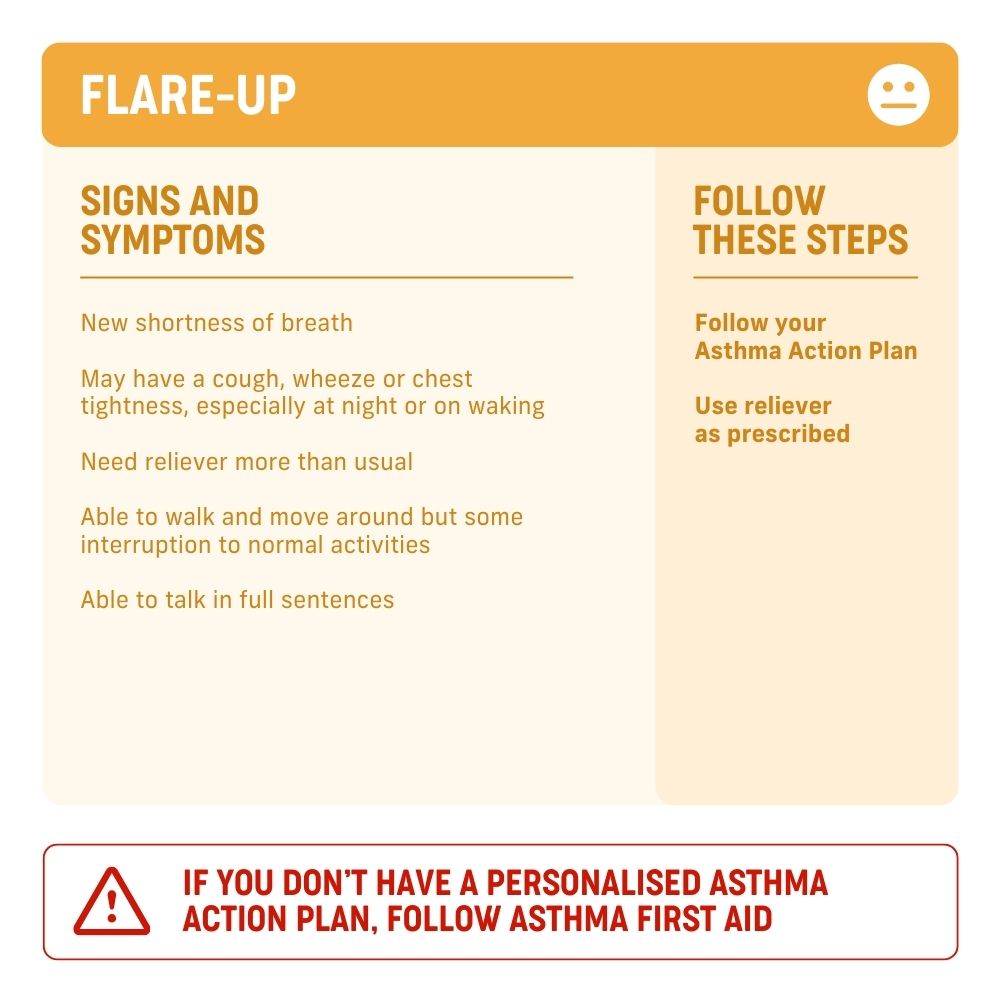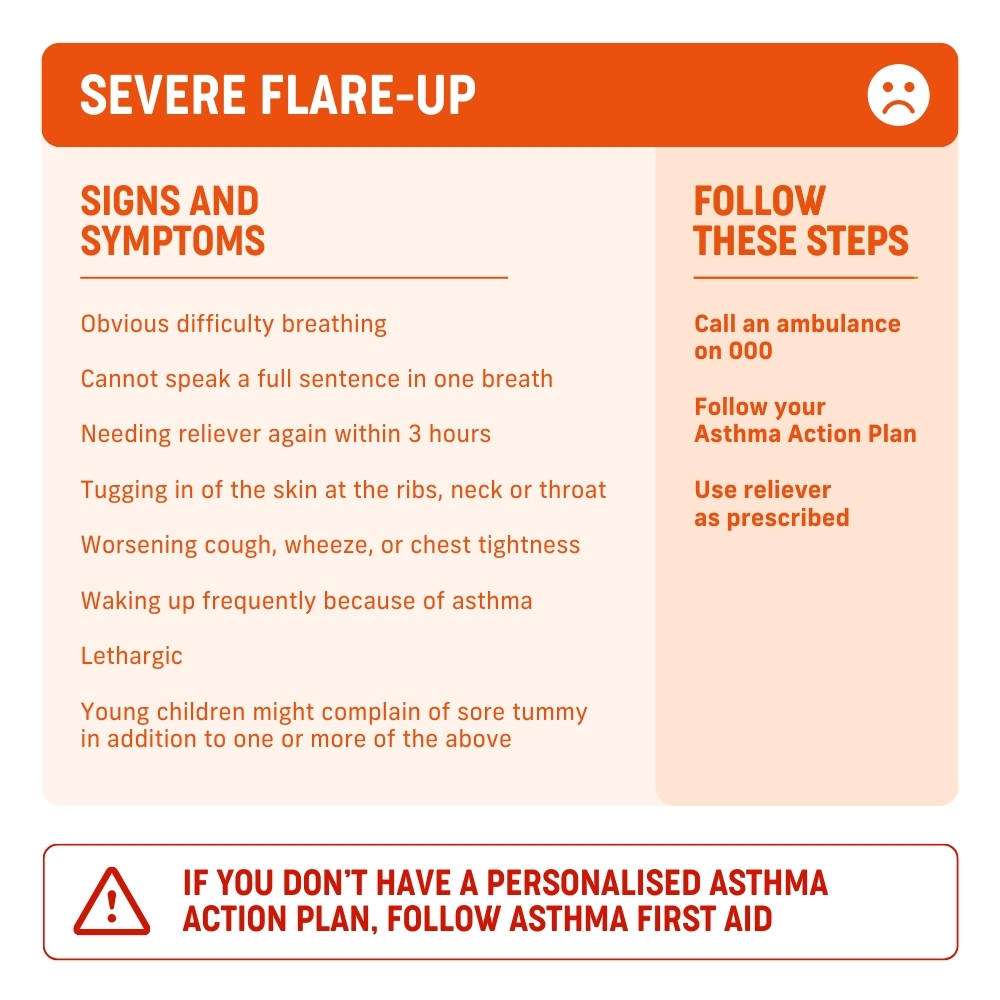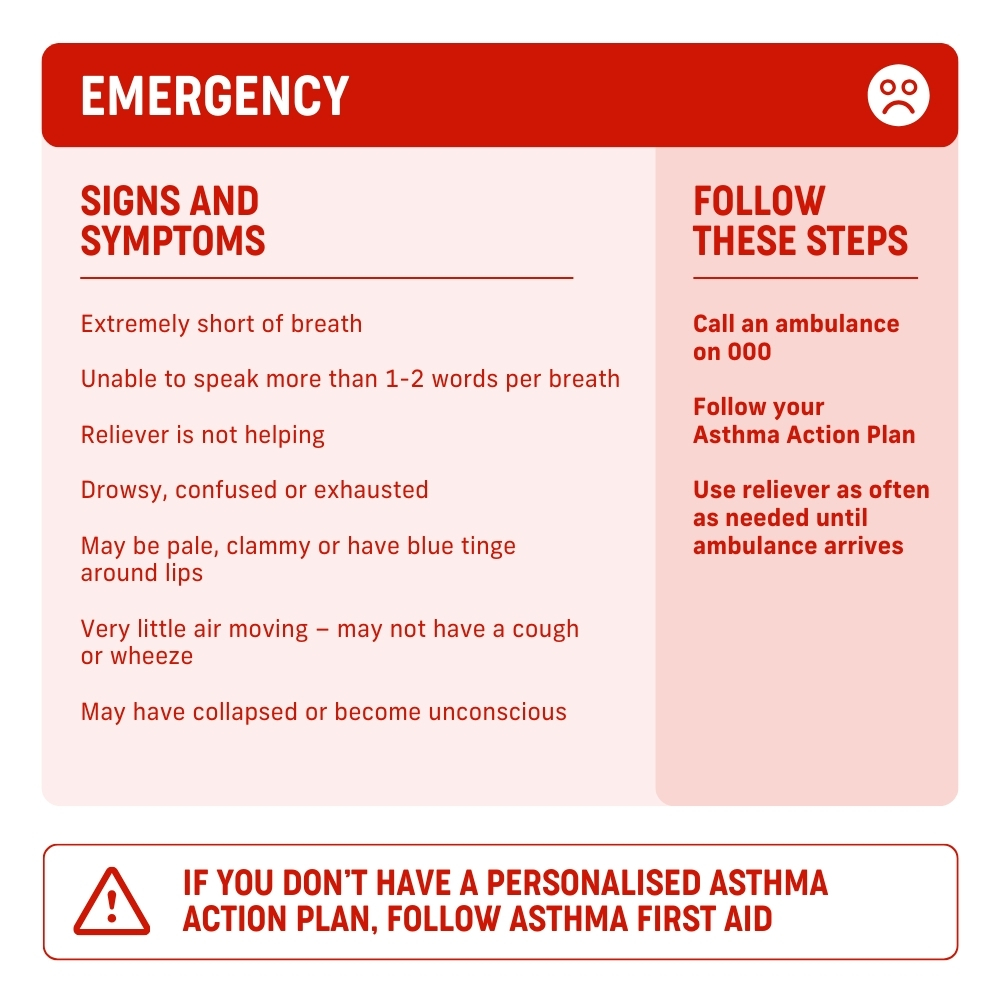What are the symptoms of asthma?
Not all people with asthma have the same symptoms.
Not all people with asthma have all the symptoms.
Asthma symptoms are the signs, effects or feelings that you may notice as a result of having asthma. Your asthma symptoms are caused by changes in the airways (breathing tubes) of your lungs. These changes make it harder to breathe.
The most common asthma symptoms are:
1. Cough
A cough happens because your airways have narrowed, and more mucus has formed. A cough caused by asthma might be:
- an on-going cough or one that won’t go away
- a cough that only occurs during the night or early morning
- a cough during sport or activity
- a cough when excited or laughing.
2. Wheezing
A whistling or squeaky sound when you breathe is made by the narrowing of your airways.
3. Shortness of breath
Feeling breathless, or out of breath, because your airways are too narrow to allow the air you need in or out.
4. Chest tightness
This might feel like something is squeezing or sitting on your chest. This is the feeling of the muscles around your airways tightening.
Symptoms range from mild to more serious. Asthma symptoms are often worse at night or early morning, making it hard to sleep.
You might have other symptoms that include:
- feeling tired
- increased heart rate
- becoming sweaty.
These symptoms may happen because of the extra work needed for breathing. Using all your chest muscles to help with your breathing means you need more energy, which makes your heart beat faster.
We also know that:
- symptoms can be different from person to person
- symptoms can change for one person from one time to another
- symptoms can be every now and then, or all the time.
What Are Silent Symptoms?
Some people with asthma may have silent symptoms. They may not notice any asthma symptoms until they become really unwell.
Being breathless can be a silent symptom. It’s not as obvious to you or others as coughing a lot or wheezing. It can also be ignored or passed off as being unfit or tired. For people with silent symptoms, sometimes their doctor will ask them to use a peak flow meter to help them measure whether their airways are narrowing.
If you or someone you care for has silent asthma symptoms, you should let people around you (doctors, school/daycare staff, work colleagues, family and friends) know so they can help and support you when you need it.
Symptoms In Kids
Asthma symptoms in kids can be harder to spot. Kids have much smaller breathing tubes (airways) than adults. This means even small changes to how their airways work can make a big difference to their breathing.
As kids can’t always tell us their symptoms, we need to rely on all our senses to understand what might be happening. Knowing what symptoms to look for can help you and your doctor decide on the right course of action for your child. Like adults, they may not have all the symptoms, but some things to look out for include:
1. Being breathless or difficulty breathing
Think about how your child breathes when they are well. This makes it easier to look for symptoms when they are unwell. For all kids, especially our younger ones, look for these signs and symptoms of breathing difficulty or being breathless:
- Does your child breathe through their mouth or their nose?
- If they have a virus or a blocked nose from allergies, breathing through their nose is more difficult. When their nose can’t filter, warm or moisten the air they breathe, breathing in air through their mouth may irritate their small breathing tubes.
- Changes in how your child breathes:
- Look at their body while they breathe. Are they breathing faster than usual or are there any sounds made while breathing?
- Are they using their body to help them breathe? For example, raising their shoulder when they take a breath.
- Activity levels:
- Does your child get out of breath while playing or stay out of breath for longer than usual?
- Is your child avoiding activities because they get breathless?
- Are they quieter or more irritable than usual?
- Have they said they have a sore tummy?
More serious signs that your child is struggling to breathe and needs emergency help include:
- the soft area at the bottom of their throat (where it meets the chest) is sucking in and out during breathing
- their tummy is sucking in or pumping up and down
- the muscles between the ribs are sucking in when they take a breath
- their lips are turning blue.
- they are unable to finish their sentences or eat because they are so breathless
Any sign of breathing difficulty should result in a visit to the doctor. These symptoms will help your doctor to understand your child’s condition and decide which treatment will be best for them. It’s important to tell them about all your child’s symptoms, even if you feel like they are normal.
2. Wheezing
A wheeze is a high-pitched whistling sound made by the airways when they are narrowing. It can sometimes be easy to hear, or your doctor may hear it as they listen to your child’s breathing using a stethoscope. A wheeze can be caused by several things, including asthma. However, not all children will have a wheeze with asthma.
A wheeze is more likely to be asthma if it’s:
- very frequent
- worse at night or early in the morning
- happens when your child doesn’t have a cold
- occurs in reaction to a trigger.
Talk to your doctor if your child has a wheeze.
3. Coughing
Coughs in kids can be caused by many things, and there are lots of different types of coughs. Sometimes coughing brings up mucus or phlegm. No matter how the cough sounds, talk to your doctor if your child has:
- an ongoing cough or one that won’t go away
- a cough that only occurs during the night or early morning
- a cough during sport or activity
- a cough when excited or laughing.
4. Chest Tightness
Kids might feel chest tightness when the airways are so narrow it is difficult to get the air in or out. This might make them feel like there is a heavy weight on their chest. Your child might say things like “I’m feeling sick” or “I have a sore tummy”.
If your child or a child you care for is experiencing this symptom it’s important to see a doctor and review their symptoms or seek a diagnosis.
How To Manage Symptoms
We want people with asthma to live free from their symptoms. How you take care of your symptoms will affect how well your asthma is managed.
The first step in managing your asthma is knowing:
- what your symptoms are
- how to treat your symptoms
- how to avoid triggering your symptoms.
Knowing how bad or how often you get asthma symptoms will help you and your doctor to better understand how to treat them.
A written Asthma Action Plan from your doctor will also help you to organise this information all in one place.
To keep track of your symptoms, you can use an app such as Kiss My Asthma or use the Calendar or Notes app on your phone to record them. A good tip is to assign the symptoms to different calendar colours. You can also create a simple table on a page or use sticky notes to track your symptoms. You can record your symptoms over several days or a couple of weeks before visiting your doctor.
Are You Getting Used To Asthma Symptoms?
Sometimes, you or your child might have asthma symptoms so often that you get used to these symptoms. It becomes the ‘new normal’ way of being or breathing.
Ignoring or putting up with symptoms can be dangerous because your asthma can become worse more quickly. Without treatment of your symptoms, there may also be long-term damage to your lungs.
If you have trouble with your symptoms, talk with your doctor about how they can help.
What Should I Do If I Think I Have Asthma Symptoms?
If you suspect you or your child might have asthma after reading about the symptoms, you should see your doctor for a diagnosis. Don’t ignore the symptoms – if you or your child do have asthma, the sooner you get it under control, the faster you can get back to living a full and active life.
Worsening Asthma Symptoms
Your asthma symptoms can become worse over time or very quickly. Symptoms of worsening asthma include:
Use Asthma First Aid to treat worsening symptoms that are not improving.
Do You Still Have Questions?
Book a free call with our Asthma Educators here. They can provide you with support between your doctor’s visits and give you the information you need to feel confident to have a productive conversation with your doctor about your asthma, or that of a loved one.













